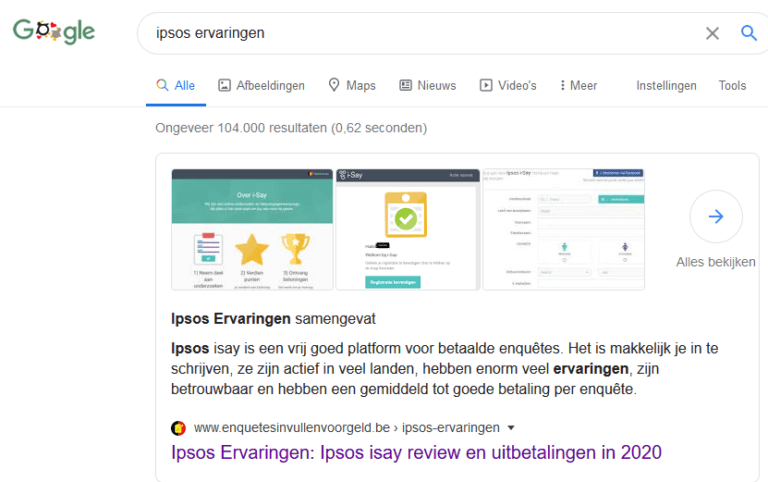Wat is een snippet?
Laatste update: 27 maart 2022
Als je een blog schrijft (of gewoon een andere soort website hebt, zoals een affiliate site of e-commercewinkel) is het van cruciaal belang dat je hoog scoort in de zoekresultaten bij een zoekmachine.
Hoe hoger je in de rangschikking van bijvoorbeeld Google staat voor een bepaald (populair) keyword, hoe meer verkeer je zal binnenhalen, en in theorie hoe meer geld je kan verdienen.
Er zijn een heleboel SEO-technieken die je kan toepassen om zo hoog mogelijk te komen, zoals backlinks kopen, zoekwoordonderzoek, enzovoort.
Maar wist je dat er nog een betere optie is dan in de top zoekresultaten komen?
In dit artikel bespreek ik featured snippets en leg je uit hoe je deze ook kunt halen.
Wat is een snippet?
Een snippet is een samenvatting van een paragraaf van een bepaalde websitepagina die het best een bepaald zoekwoord omschrijft.
Een fragment dat de inhoud van een bepaalde pagina goed omschrijft, mensen zo goed mogelijk informeert over een bepaalde zoekopdracht, en/of antwoord geeft op een bepaalde vraag.
Hier heb je een voorbeeld van een snippet dat ik heb op een van mijn andere websites:
Zoals je kunt zien is dit een speciaal omkaderd resultaat dat bovenaan alle zoekresultaten wordt getoond.
De omschrijving van wat op de pagina staat (gerelateerd aan het zoekwoord) staat eerst, en dan pas komt de link naar de website zelf.
Dit is een omkering van het gewone formaat van de zoekresultaten, en heeft als doel om mensen meteen, in een oogopslag, informatie te tonen.
Veel websites hebben hier al over zitten klagen omdat Google in feite verkeer naar hun sites stopt.
Als mensen op zoek zijn naar het antwoord op een vraag, en ze krijgen dat meteen op de zoekpagina, moeten ze immers niet meer surfen naar de website die het antwoord heeft.
Hoe kan je een featured snippet halen?
Een featured snippet halen kan je voornamelijk doen door je artikelen te structureren zodat het zoekmachinealgoritme er korte en duidelijke antwoorden op veelgestelde vragen in kan vinden.
Dit is langs de ene kant redelijk moeilijk, maar langs de andere kant ook vrij eenvoudig.
Eerst en vooral kan je je website niet opgeven om als featured snippet gekozen te worden.
Het algoritme van Google bepaalt automatisch wat het snippet is, niet het publiek of een manuele aanpassing.
Het enige dat je dus kunt doen is je artikelen opstellen zodat er een aantal paragrafen in staan die de belangrijkste sleutelwoorden goed omschrijven.
Als je op bepaalde vragen probeert te ranken, zoals hier in dit artikel “Wat is een snippet?”, dan moet je ervoor zorgen dat je die vraag in een duidelijke H2 titel hebt, met een duidelijk antwoord in 1-2 zinnen eronder.
Kortom, snippets zijn zeer leuk om te halen, maar buiten er rekening mee te houden tijdens het schrijven van je artikels en die zo optimaal mogelijk te maken, kan je er niet erg veel aan doen.
Zoals gewoonlijk bepaalt de software achter de zoekmachines alles.
Als jouw artikel een bondige en informatieve paragraaf bevat over een bepaald zoekwoord, maak je kans om een snippet te halen.
Wil je zelf beginnen met een blog opstellen, dan kan je een domein en hosting aanschaffen via BlueHost.




